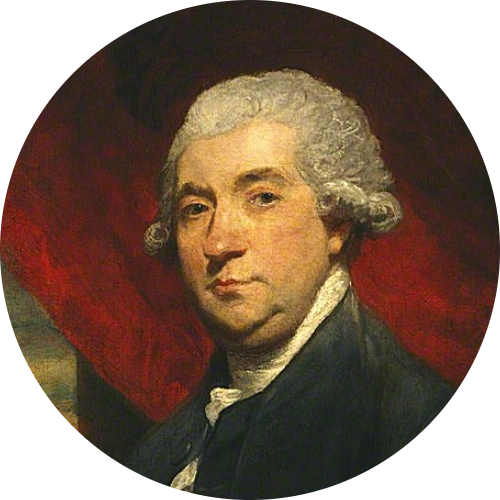Irish actor, theatre-manager and a teacher of elocution. Born in Dublin, Ireland, the son of Rev. Dr. Thomas Sheridan (1687-1738) and Elizabeth Macfadden. Father of Charles Francis Sheridan (b. 1750) and Richard Brinsley Sheridan (b. 1751). Married Frances Chamberlaine in 1747. Sheridan's godfather was author Jonathan Swift.
Thomas Sheridan was sent to be educated at Westminster School, London in 1732-3, however, due to his father's financial difficulties he had to return and finish his initial education in Dublin. In 1739 he graduated BA from Trinity College, Dublin, and he probably got an MA from Trinity at some time before 1743.1
In 1743 Sheridan made his debut as an actor, playing the title role in Shakespeare's Richard III at Smock Alley, Dublin. In the next year or two, he became immensely popular, and was, at the time, the most popular actor Ireland had ever seen. Also in the 1740s, he became manager of the Dublin theatre.
Sheridan and his family moved permanently to England in 1758, where he established himself as an educator and teacher of elocution. He lived in London for a number of years, until, in 1770, he moved to Bath, where he founded an "Academy for the regular instruction of Young Gentlemen in the art of reading and reciting and grammatical knowledge of the English tongue".2 The academy was not too successful, and in the fall of 1771, he was again acting at the Dublin theatre. In 1776, Thomas' son Richard became a part owner of the Theatre Royal, Drury Lane in London, and in 1778, Thomas Sheridan himself was appointed manager of the theatre, a position which he held until 1781.
Among his numerous writings were the farce The Brave Irishman or Captain O'Blunder, which premiered in Dublin about 1738, and the books British Education (1756),3 his influential A Course of Lectures on Elocution (1762), A Plan of Education for the Young Nobility and Gentry of Great Britain (1769) as well as a new dictionary with a special attention paid to the pronunciation of words (rather than the meaning). Ca. 1784 he also edited and published the multi-volume Works of Jonathan Swift, to which was appended the Life of Swift (Swift's private journal, as far as can be discerned).
Boswell had "adopted Thomas Sheridan as his mentor in Edinburgh in 1761, where Sheridan had come to give a series of lectures."4. One of Boswell's friends at the time was West Digges, who had previously acted with Sheridan at the latter's Theatre Royal in Dublin, and it is likely that Digges had played some part in introducing the two.
The first mention of Sheridan in Boswell's London Journal is on November 28, 1762, when Boswell went to see him in London. On this occasion, Sheridan aired his newly found dislike for Dr. Johnson, as sometime earlier Sheridan had helped Johnson get a government pension. Now, Sheridan had got one as well, causing Johnson to exclaim "What!, has he got a pension? Then it is time for me to give up mine." - Sheridan apparently never forgave him.5 He also frequently criticized David Garrick.6 Boswell often went to see the Sheridans, especially during the early part of his stay in London.
On New Year's Eve, 1762, Boswell spent the evening at Sheridan's in the company of Mrs. Sheridan, Mrs. Cholmondeley, Capt. Jephson and Colonel Irwin. They had tea and listened to a reading of Frances Sheridan's new comedy The Discovery.
On January 18, 1763, Boswell visited the Sheridans to inquire about a prologue he had written for The Discovery. Apparently, Thomas Sheridan did not care much for Boswell's prologue, and a new one had been written by Mrs Sheridan herself. This caused Boswell to consider not seeing them again, but eventually, he reconsidered and decided to keep enjoying their company without caring about their opinions of him.
Following another visit on March 24, Boswell wrote in his journal:
I had called there a few minutes one day before; and both at that time and this I never mentioned The Discovery, which I thought the best way to pique them a little. This day he at last said to me, "You saw The Discovery only the first night?" "No more," said I. SHERIDAN. "O, then you did not see it to half the advantage." BOSWELL. "What, was it lightened?" (Garrick [had] said [to me], "We lightened it.") In this manner did I nettle them.
Paying Boswell back in kind, Sheridan said, during the same visit, about Andrew Erskine: "No, no, he is no poet. Neither you nor he are poets." Boswell noted in his journal that "[t]his was somewhat impertinent.", apparently unaware of the inherent irony of the situation, and his previous resolve not to care.7
Sheridan also helped out Boswell when he had a gambling debt in 1761, and Boswell promised Sheridan that he wouldn't play cards again for 5 years,8 or at least that he wouldn't "lose more than three guineas in one sitting".9 Thomas Sheridan disappeared almost entirely from Boswell's writings during Boswell's tour of Europe, 1763-1766, although Boswell, in a memo on May 11, 1764, reminded himself to write to his former mentor.
Esther K. Sheldon's (1967) Thomas Sheridan of Smock-Alley, recording his life as actor and theater manager in both Dublin and London; and including A Smock-Alley Calendar for the years of his management is a great biography of his youth and his life as an actor and theatre manager. The author, Sheldon, recommends Wallace A. Bacon's Elocutionary Career of Thomas Sheridan (1964) as a biography of his life as an elocutionist. Most of the titles mentioned in this article can be found (some in original 18th century first editions) via AbeBooks and other premium online libraries.
